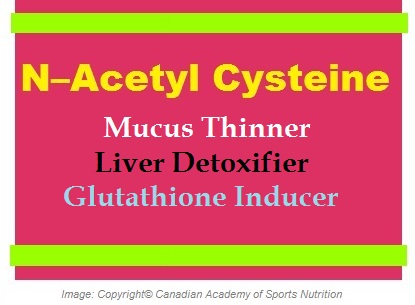NAC is a derivative of the amino acid cysteine. It is a potent antioxidant  normally found in the body. Being used as a mucolytic agent (mucus thinner), NAC helps the body produce glutathione.
normally found in the body. Being used as a mucolytic agent (mucus thinner), NAC helps the body produce glutathione.
Natural Sources:
Normally, NAC by itself is not found in the foods. However, cysteine can be found in foods high in protein.
Potential Health Benefits of NAC:
- Acetaminophen overdose or toxicity.
- As a mucus thinner in bronchitis, chronic obstructive pulmonary disease (COPD), cystic fibrosis (CF), pneumonia, and pulmonary fibrosis.
- To increase glutathione level.
- Liver detoxification.
- Angina pectoris.
- Immediately after a heart attack.
- Immune support in HIV/AIDS.
- Gastritis.
- Reducing risk of developing colon cancer in people with colon polyps.
- It may improve athletic endurance and performance.
- Prevention of kidney damage due to contrast medium.
- Prevention of the bladder inflammation after using the chemotherapeutic agent cyclophosphamide.
- Useful in psychiatric disorders, such as depression, mania, autism, and schizophrenia.
- Drug addiction (it may reduce craving and desire for cocaine, methamphetamine, and marijuana).
Dosage, Side Effects, and Interactions:
Daily dosage of NAC is 500 – 1500 mg. A small percentage of NAC users may report headache, dizziness, nausea, abdominal pain, and dry mouth. It may also increase urinary loss of zinc and copper.

